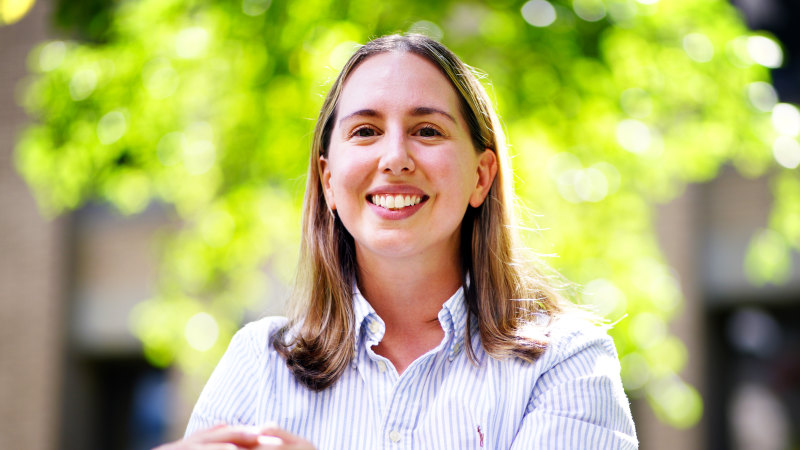Beth Radulski was well into adulthood when she learned she was autistic, but the diagnosis triggered a welcome turnaround in her academic career.
Before her diagnosis in her mid-20s, education was a constant and debilitating struggle for Radulski, who failed year 9 and quit a number of university courses.
Education was a constant struggle for Beth Radulksi before her autism diagnosis in her 20s.Credit: Luis Enrique Ascui
Today she is a PhD candidate at La Trobe University’s Department of Social Inquiry, where she is spearheading a groundbreaking employment program at the Olga Tennison Autism Research Centre.
Radulski attributes her educational setbacks to habitual masking and camouflaging her autistic traits to try to fit into a neurotypical world.
“I found the effort required to mask at work and in the classroom exhausting, and I would burn out and I wouldn’t be able to continue with my studies,” she says.
About three-quarters of autistic people regularly try to hide their condition, often at great mental cost, Radulski says.
Radulski is a La Trobe University PhD candidate and heads a work placement program supporting neurodiverse students.Credit: Luis Enrique Ascui
“Masking and camouflaging is linked to anxiety, depression, suicidality, poor sense of self and burnout, which then makes it very difficult to succeed in educational and professional environments.”
Some employment programs for autistic people implicitly encourage masking behaviours in the belief participants will better adapt to the neurotypical workplace by trying to fit into it, Radulski argues.
Her program, launched this year with an initial intake of 10 students, aims to flip that expectation by equipping graduates with the skills to make workplaces better at supporting people diagnosed with neurological conditions such as autism and ADHD.
“A lot of initiatives aimed at neurodiversity inclusion have taken the approach that if we can teach people social skills, they’ll do better at work,” she says.
“My research is questioning that. I’m more interested in how can we change educational institutions and workplaces to reduce the pressure to mask and camouflage?”
Autistic people are statistically much more likely to be unemployed and more likely to end their education by year 10 or earlier, data shows.
According to a 2021 Autism Co-operative Research Centre submission to the Australian government, 32.4 per cent of autistic people did not study beyond year 10, and just 38 per cent of autistic people of working age are in the workforce. Unemployment rates are eight times greater than average, the submission said.
Students in La Trobe’s neurodiversity placements program will do 100 hours of research and up to 300 hours of industry placement, with the dual aim of gaining work experience and making the workplaces where they train more inclusive.
‘I’m more interested in how can we change educational institutions and workplaces to reduce the pressure to mask and camouflage?’
Applicants must detail how their study and career goals relate to supporting neurodiverse people. The 10 inaugural participants in the placement program study in fields including neuroscience, psychology and social sciences.
Among them is Erin Salmon, 22, a third-year psychological science student.
Salmon already has four part-time jobs, all of which involve supporting people with neurodiversity, so she isn’t using the program solely to improve her own employment prospects, though she believes it will.
An aspiring psychologist, she wants to help other neurodiverse students get ahead.
Salmon is also autistic, and masked her autism for years in the belief that her job prospects would suffer if she didn’t.
“I worked for a fast-food chain for three years in what was definitely not an environment where I was afforded any allowance,” she says.
“My diagnosis was kept very close to the chest, as I felt like I would be judged and even possibly given less shifts if this was disclosed early on.”
Salmon says there is still a large stigma around being a neuro-minority, which she hopes future research and more awareness will help remove.
“Everybody that has the skills should have the right to be employed.”
The Morning Edition newsletter is our guide to the day’s most important and interesting stories, analysis and insights. Sign up here.
Most Viewed in National
From our partners
Source: Read Full Article



